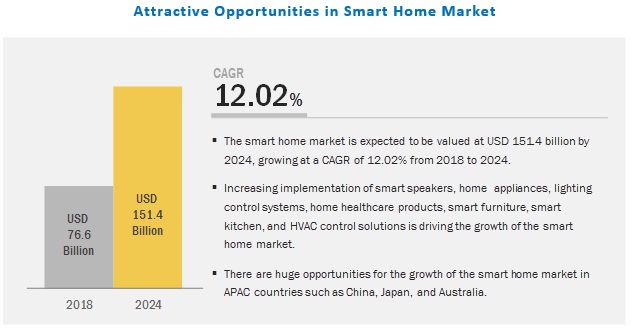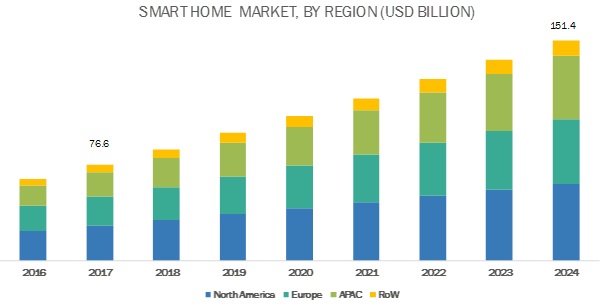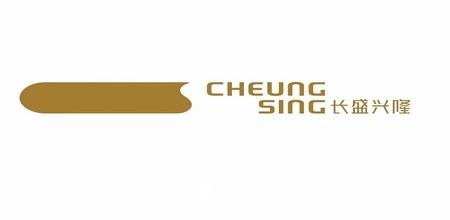Smart Home Market - Global Forecast to 2024: Market was Valued at USD 76.62 Billion in 2018 and is Expected to Reach USD 151.38 Billion by 2024
According to the report published by Research and Markets in January 2019, the smart home market was valued at USD 76.62 billion in 2018 and is expected to reach USD 151.38 billion by 2024, at a CAGR of 12.02% during the forecast period.
The growth of the smart home market is driven by various factors, such as a large base of internet users and increased adoption of smart devices; rise in the awareness of fitness and healthy lifestyles owning to the high disposable income in developing economies; high importance of home monitoring from remote locations; rise in the need for energy- saving and low carbon emission solutions; cost reduction measures enabled by smart homes; rapid proliferation of smartphones and smart gadgets; existence of market players focusing on expanding their smart home product portfolios; and widespread concern about safety, security, and convenience.

Increasing adoption of entertainment and other control systems, lighting control solutions, smart speakers, and home appliances driving the growth of the market for smart homes.
Entertainment and other controls segment to hold the largest share of the smart home market during the forecast period
Entertainment has become an important part of life as it provides relaxation and rejuvenation. A multi-room entertainment control system allows the user to centralize all connected devices and then listen to, watch, and control that equipment from every room in the house simultaneously or independently. Major control systems used in smart homes are audio, volume, and multimedia room controls. The growth of the market for audio, volume, and multimedia room controls is driven by the convenience offered by these controls for managing as well as controlling the entertainment systems within a house. Advancements in wireless communication technologies is a major factor in boosting the growth of the market for home theater system controls, thereby driving the overall smart home market for entertainment controls. The large market share of this segment can be attributed to the high penetration rate of products such as smart meters and smoke detectors. The increasing cost of electricity is a major concern that drives household consumers toward energy savings. Moreover, the increasing popularity of smart plugs, smart hubs, and smart locks is also fueling the adoption of control systems.
Behavioral type software and services to hold the largest market size during the forecast period
The increasing connectivity between machine-to-machine solutions and the Internet of Things is driving the growth of the smart home and energy management markets, which has, in turn, influenced the growth of the market for software and services for smart homes. The behavioral type software and services help analyze energy-related data and forward it to end users. This category is restricted to transmitting and receiving data and does not perform intelligent actions like the proactive type. Behavioral type solutions provide direct feedback to end users, thereby providing the basic information regarding the real-time energy data, along with the historical data reflecting energy usage. Therefore, behavioral type software and services are likely to hold the largest market share in 2018.

Market in APAC is expected to grow at a significant rate during the forecast period
The smart home market in APAC is expected to grow at the highest rate during the forecast period. Factors driving the growth of the market in this region include strong economic growth, increased population, and improved standard of living, and rapid urbanization that leads to a sophisticated infrastructure. China is likely to account for the largest size of the smart home market in APAC in 2018. However, with the growth of the smart home industry and large-scale implementation of hardware and software solutions in smart homes in China and Japan, the market in these countries is expected to grow at a higher rate during the forecast period. APAC is considered as a huge market for smart homes because of the considerable rate of implementation of various products such as lighting controls, HVAC controls, security and access controls, among others, in the region.
To meet the growing market demands in China, Citiexpo will launch the Smart Home Expo from March 5 to March 7, 2020, co-located with the 26th Windoor Expo at Nan Fung International Convention & Exhibition Center, Guangzhou in China.





